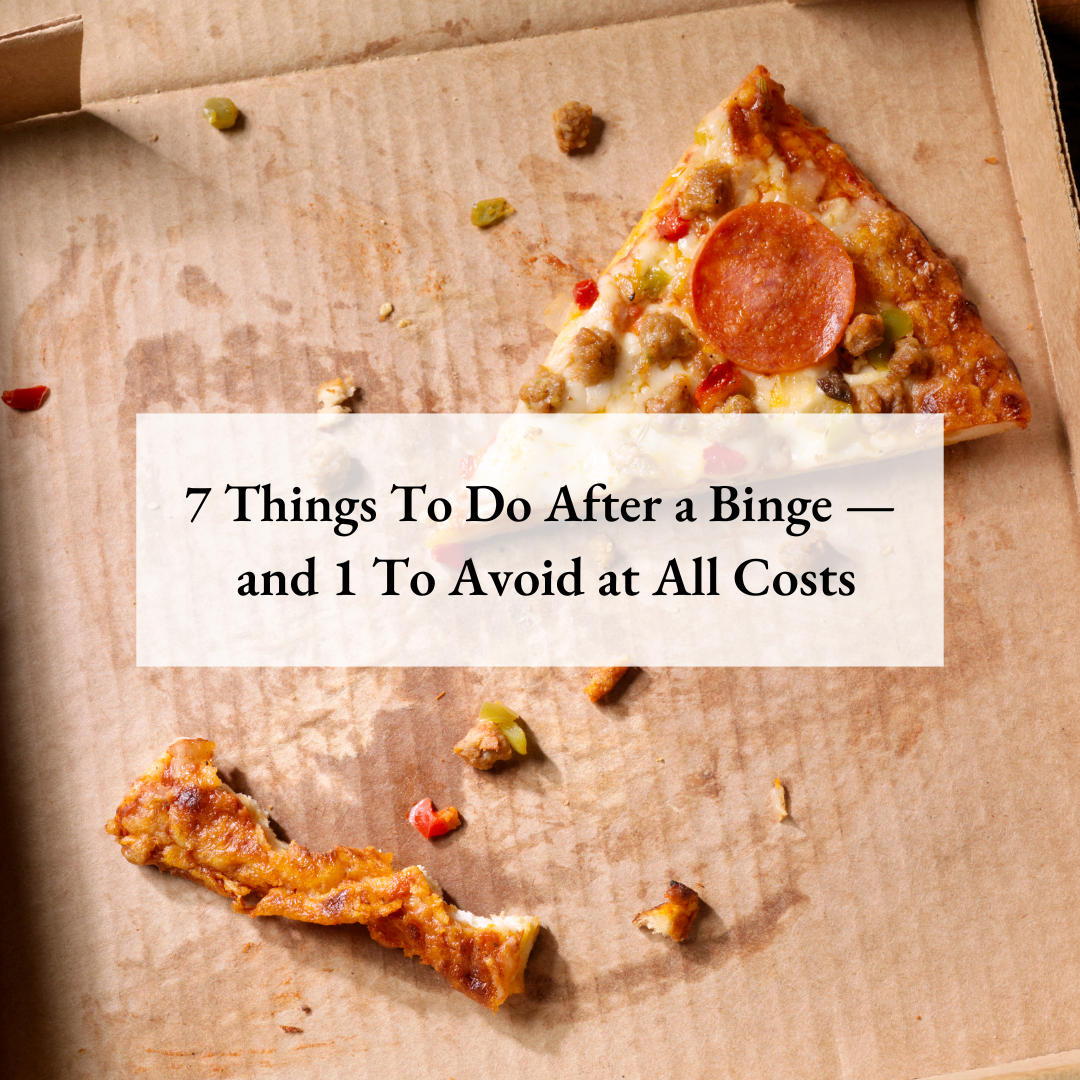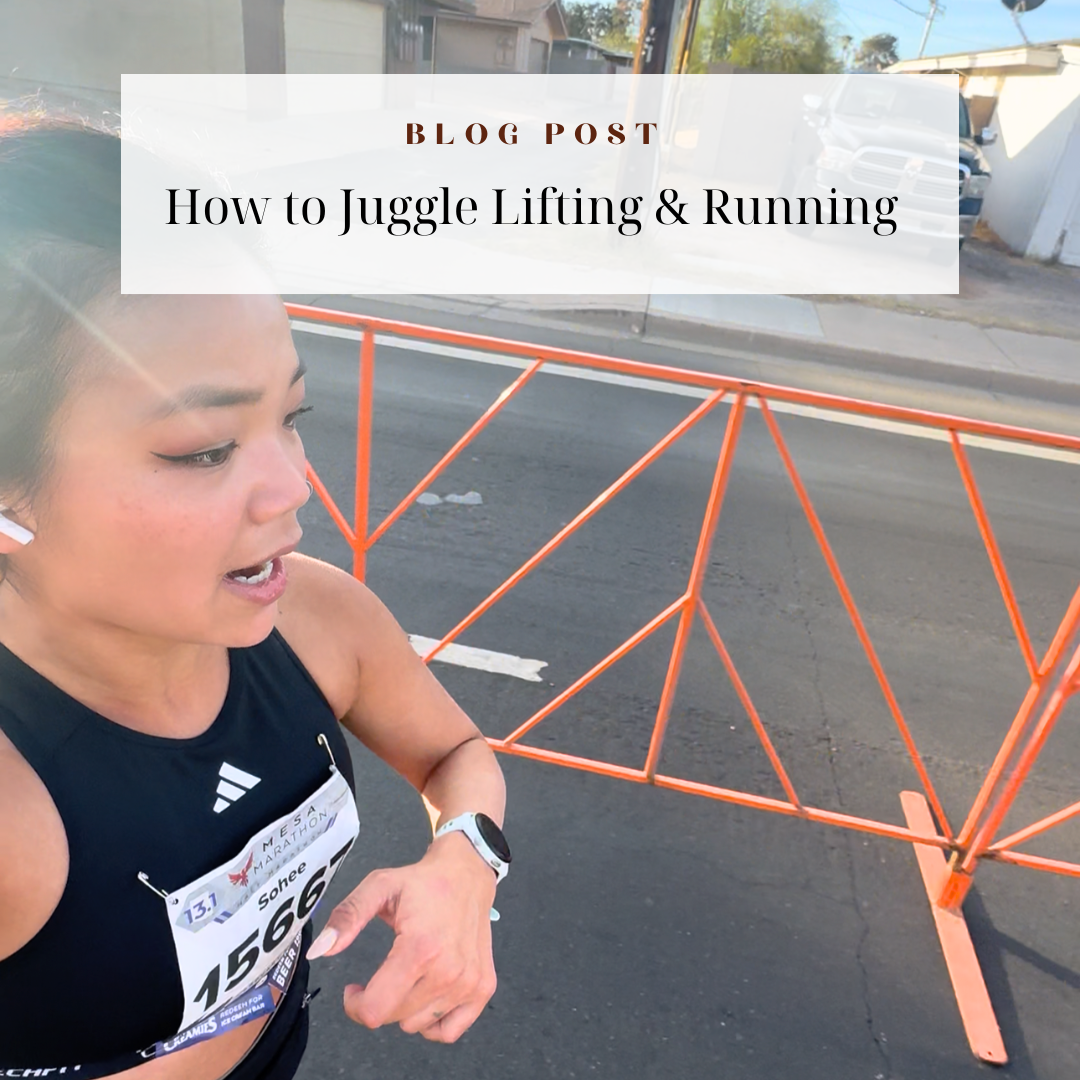7 Things To Do The Day After a Binge and 1 To Avoid At All Costs

Everything was fine. And then suddenly it wasn’t.
It was like time stood still for a split second, and when things slid back into focus, you saw the aftermath: the empty chip bags, the crumbs, the multiple dirty utensils in the sink. Your stomach aches—not just from the food, but from the shame.
You binged. Again.
***
Years ago, this was me. My experience was unique (everyone’s is), but it definitely checked the box for both hallmark characteristics of binge eating:
- eating an excessive amount of food in a defined period of time (for objective binges), and especially
- a sense of loss of control
Contrary to popular belief, binge eating doesn’t happen to everyone. It affects a small percentage of the population, and these people often struggle in isolation, desperately frustrated and completely lost about how to stop.
As I learned, the day after a binge is always rough, but it’s also a pivotal time that can make or break you. Read on for seven evidence-based tools to help you recover from a binge the right way and break the cycle for good.
1. Eat.
It’s probably the last thing you want to do, but the best way to break the binge eating cycle is by nourishing your body as though it were any other day. It doesn’t have to be a huge meal, but restricting your intake after a binge only serves to perpetuate the pattern.
It’s common to wake up hungry the day after a binge eating episode, craving the same hyper-palatable foods you likely binged on. Rather than ignoring your hunger pangs, build your first meal or snack around lean protein, healthy fats, and fruits and vegetables. Aside from keeping you satiated, a balanced plate may help stabilize blood sugar and set the tone for a better day.
And don’t just eat one meal. You need proper and consistent nourishment, regardless of what you consumed the previous day. Research shows that committing to a regular eating pattern is one of the most effective ways to disrupt binge eating behavior because it reintroduces structure and control into an otherwise chaotic environment.
2. Hydrate.
Staying well-hydrated is always a smart idea, but it’s particularly important after a binge. Aside from helping with digestion (which will probably be slow), sipping on water can reduce bloating and aid in satiety, which makes for a smoother transition back to your normal habits.
3. Move.
It’s normal to wake up feeling lethargic, foggy, and somewhat depressed after a binge, but don’t give in to the desire to wallow in bed all day. If you don’t have the energy or emotional bandwidth to get back to your regular training program just yet, get outside for some gentle movement.
A leisurely walk or bike ride can clear your head, support digestion, and break up the day by giving you something else to focus on.
I’m not suggesting you hole up in the gym for multiple hours to burn off what you ate the day before. Attempting to compensate for yesterday’s calories with extreme amounts of exercise can exacerbate an already dysfunctional relationship with food and lead to overuse injuries.
4. Dress for comfort.
This isn’t about shame or avoidance. Putting on a comfortable outfit that puts you at ease is a great way to show yourself a little love.
When you’re emotionally vulnerable, wearing form-fitting clothes might exacerbate insecurities. If you don’t have the skills to regulate these feelings and negative thought patterns, you risk making yourself more susceptible to a binge.
That being said, this is a general recommendation that most people find helpful. Wear whatever makes you feel confident, comfortable, and level-headed.
5. Put away the scale.
In my experience, stepping on the scale the day after a binge was a form of self-flagellation that led to guilt, shame, and some minor freak-outs.
Thanks to water retention caused by salty, carbohydrate-rich foods and sluggish digestion, it’s pretty much guaranteed that you’ll weigh more the day after a binge.
With that in mind, post-binge scale weight is not an accurate reflection of anything, so there’s no point in fixating on it. There’s a time and place for self-monitoring tools, but immediately after a binge is definitely not it.
6. Revisit your values.
Identifying your core values is a powerful way to determine who and what is most important to you. And chances are, binge eating doesn’t align with any of them.
I’ve always valued integrity, personal development, relationships, and well-being. When I was struggling with binge eating, all four took a huge hit.
→ I was routinely lying about what and how much I ate.
→ I was extremely unproductive because I spent hours attempting to compensate for my binges.
→ I shut out my friends and family because I was so ashamed of what I was doing.
→ I felt exhausted, sick, and emotionally drained most of the time.
All of the decisions I made were completely at odds with my values. As a result, I was miserable. It wasn’t until I acknowledged my values, every single day, that I started living a life that felt authentic.
Do your best to revisit your values whenever you’re faced with the urge to binge. The choice is yours, even if it doesn’t feel like it.
7. Forgive yourself.
At the end of the day, we all mess up. It’s an unavoidable part of being human and beating yourself up won’t get you anywhere but stuck. Instead of ruminating over mistakes, try to learn from them instead. Ask yourself:
❓ What happened during the day(s) leading up to the binge?
❓ What was I doing and/or thinking immediately before I started binging?
❓ Is there anything I could have done differently before I started binging?
This practice is known as self-compassion and it’s been shown to be particularly helpful for people who struggle with disordered eating patterns, like binge eating. According to a recent study, self-compassion may buffer the relationship between shape/weight overvaluation and adverse outcomes because it helps us regulate negative emotions related to self-criticism more effectively.
Now that we’ve touched on what you should do after a binge, I want to stress the number one thing you must avoid at all costs if you’re serious about turning things around:
→ Compensating for what you ate with dieting, laxatives, appetite suppressants, or other tactics.
It’s been shown time and time again that binge eating is much more likely to occur on days where you’re actively dieting. Fasting, restricting overall calorie intake, avoiding specific foods or food groups… all of these behaviors play a direct and important role in the cause of binge eating.
Other compensatory behaviors are equally harmful for the same reason. They’re also extremely futile because they don’t affect calorie absorption nearly enough to negate a binge. For more on this topic, I highly recommend checking out Overcoming Binge Eating by Dr. Christopher G. Fairburn.
I learned the hard way that compensating for binges only makes the subsequent ones worse. I hit rock bottom multiple times before finally accepting that the only way out of the vicious cycle was through it.
It might be one of the hardest things you’ll ever do, but I can promise that what’s waiting on the other side is worth every second of the struggle.
If you need help healing your relationship with food and establishing healthy behavior patterns, visit ELTMethod.com for more information about our team and coaching methods.
References
Blom, W.A.M., Lluch, A., Stafleu, A., Vinoy, S., Holst, J.J., Schaafsma, G., & Hendriks, H.F.J. (2006). Effects of a high-protein breakfast on the postprandial ghrelin response. Am J Clin Nutr, 83(2), 211-220. doi: 10.1093/ajcn/83.2.211
Fairburn, C.G. (2013). Overcoming binge eating (2nd ed.). The Guilford Press
Linardon, J., Susanto, L., Tepper, H., & Fuller-Tyszkiewicz, M. (2020). Self-compassion as a moderator of the relationships between shape and weight overvaluation and eating disorder psychopathology, psychosocial impairment, and psychological distress. Body Image, 33: 183-189. doi: 10.1016/j.bodyim.2020.03.001
Taylor, A.E., Hubbard, J., & Anderson, E.J. (1999). Impact of binge eating on metabolic and leptin dynamics in normal young women. Journal of Clinical Endocrinology and Metabolism, 84(2), 428-434. doi: 10.1210/jcem.84.2.5502
Sivyer, K., Allen, E., Cooper, Z., Bailey-Straebler, S., O’Connor, M.E., Fairburn, C.G., & Murphy, R. (2020). Mediators of change in cognitive behavior therapy and interpersonal psychotherapy for eating disorders: A secondary analysis of a transdiagnostic randomized controlled trial. Int J of Eat Disord, 53(12), 1928-1940. doi: 10.1002/eat.23390





